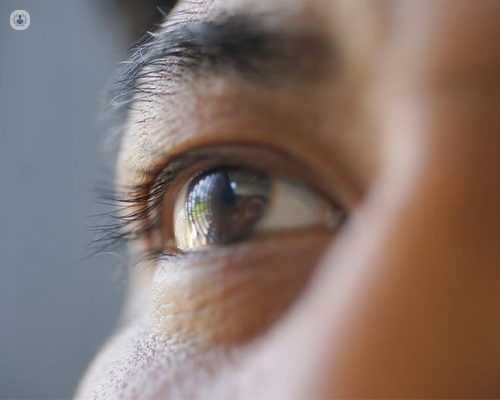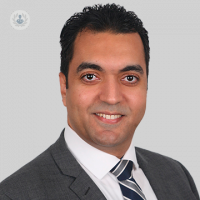What is keratoconus, and how is it treated?
Written by:In this article below, highly regarded and experienced consultant ophthalmologist, Mr Mohamed Elalfy, discusses keratoconus at length, including what the condition is, how it affects the eye, and how it is most effectively treated.

What is keratoconus?
Keratoconus is a progressive eye condition that causes the cornea (the clear dome-shaped front of the eye) to thin and gradually bulge outward into a cone shape.
What are the main associated symptoms?
Many patients are unaware that they have keratoconus. Symptoms include a need for frequent changes in eyeglasses prescriptions, blurred or distorted vision, glare, increased sensitivity to bright light, difficulty driving at night, and a sudden worsening or clouding of vision.
Keratoconus usually affects both eyes, but one eye can be affected more than the other. This condition usually starts to affect people between late teens and 30 years of age. Keratoconus can gradually progress for 10 years or more.
How is the condition diagnosed?
Early keratoconus is usually noticed by the optometrist during a standard eye check-up and will then be referred to an ophthalmologist for further assessment and treatment.
What are the causes and risk factors associated with keratoconus?
The cause of keratoconus is not fully understood. However, there are risk factors that increase chances of developing keratoconus. These include genetics, environmental factors, and pre-existing medical conditions.
How effective are glasses and contact lenses in mild cases?
In mild cases of keratoconus, a good level of vision could be achieved through the wearing of glasses or contact lenses. However, depending on how quickly the keratoconus is progressing, the prescription required to correct vision could change frequently. Contact lenses are more adept in correcting an astigmatism than glasses and rigid gas permeable (RGP) lenses mask significant corneal irregularities more than soft contact lenses (hydrogels).
Can keratoconus be cured?
Unfortunately, there is no permanent cure for keratoconus as it is a chronic eye condition. However, there are treatments that can effectively manage the condition:
- Crosslinking (CXL or C3R): a treatment which can be used to stabilise the shape of the cornea in the early stages of keratoconus. CXL involves the use of Riboflavin drops (Vitamin B2) and Ultraviolet A (UVA) light and oxygen being applied to strengthen the cornea. This option of treatment and prevention aims to stop the progression of the keratoconus.
- Intracorneal ring segments (ICRS): a treatment most commonly used when the keratoconus has progressed beyond the stage of crosslinking being an effective treatment. ICRS are thin plastic semi-circular rings that are implanted into the corneal stroma with the aim of flattening the central cornea and creating a more regular shape.
- Corneal transplant (keratoplasty): a treatment option for people with advanced keratoconus and corneal scarring. This surgical treatment involves removing the damaged cornea and replacing it with the corneal tissue of a donor.
To schedule in an appointment today with Mr Mohamed Elalfy, simply visit his Top Doctors profile.


